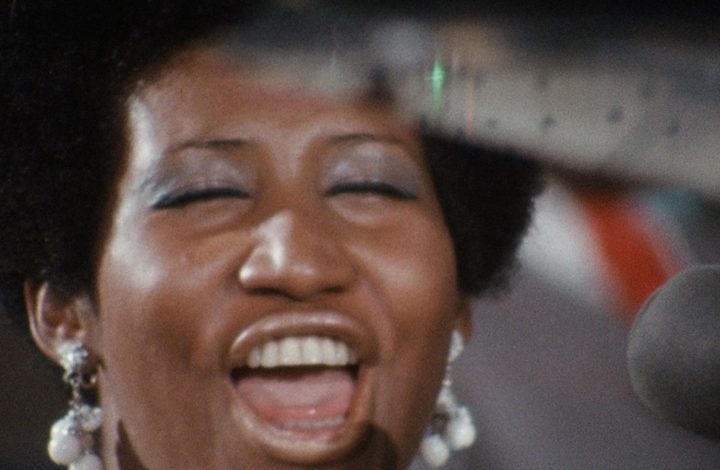
MPAA Rating: G | Rating: ★★★★★
Release year: 2019
Genre: Documentary, Music, Spiritual Director: Alan Elliott, Sydney Pollack
The word “gospel” stems from the Greek, euangelion, which essentially means “good news.” It’s an announcement of joy, a pronouncement of peace, a public declaration which is both about goodness and is good in itself. So it’s appropriate that the vocals, lyrics, and harmonies are so prominent in Gospel, a musical genre with its roots in the Christian church. A divine picture of gospel grace, the concert documentary film Amazing Grace lives up to its etymological roots–this is a good film sharing the good news via Aretha Franklin’s supernatural gift of song.
The film is made up of recovered footage from an abandoned project: in 1972, director Sydney Pollack and a Warner Brothers film crew filmed Franklin as she recorded her live Gospel album, Amazing Grace, at the New Temple Missionary Baptist Church in Los Angeles. Accompanied by Reverend James Cleveland and the Southern California Community Choir, Franklin sang for two nights before a live audience in the church, standing at the pulpit in the posture of a preacher as she belted out her musical sermons with divine fervor. The footage was never released due to technical difficulties synching the audio and visuals. Producer Alan Elliott purchased the raw film reels in 2007 and attempted to re-release the film to the public, but was sued by Franklin (twice!), delaying the film yet again. Following Franklin’s death in 2018, her estate gave Elliott permission to release the film.
In this, Amazing Grace serves as a sort of musical memorial to the great singer. It’s also, without exaggeration, one of the greatest concert films I have ever seen. The raw authenticity of the edited footage perfectly accompanies Franklin’s transcendent vocals. Amazing Grace is not only great music, but a powerful celebration of the film medium. Those film reels locked away in a Warner Brothers’ vault serve as a time machine, a portal allowing us to re-enter that church service from 40+ years ago and experience something truly special and significant. Pollack’s camera crew are clearly visible throughout the film, often in a corner of the frame or moving in the background, but definitely present. In this, Amazing Grace is a film about a film, or a film about Film–it shows us the magic of movie-making as we watch Pollack, a camera on his shoulder, frantically pointing at other photographers to get certain shots and angles in an attempt to preserve the reality of that event in time.
Those images and angles are truly wonderful, often in just the right place at the right moment. The cameras capture the beads of sweat running down Franklin’s face in close-up, the tremor of her lips, the spittle, the tears. Amazing Grace is a bodily, synaesthetic experience; this is a haptic film, incarnational cinema, the celebration of the human body in all its sweat and tears and emotions. And it is an emotional film, both on- and off-screen. Cleveland mentions in his introductory statements to the audience that if he gets “misty-eyed, it’s because I’m happy.” Reader, I was weeping tears of joy for nearly the entirety of Amazing Grace–it was one of most deeply affecting divine encounters I’ve ever experienced in cinema.
There is a tender moment in Amazing Grace where Aretha’s father, Baptist minister C.L. Franklin, leaps from his seat in the front row and uses a handkerchief to wipe the sweat from his daughter’s face while she continues to sing. It’s intimate and familial, a simple act of love. Aretha is both glamorous and humble, her sparkling sequined dress and the glistening sweat giving her an angelic glow under the bright spotlights. She is strikingly stationary behind the pulpit or piano, standing and singing in ecstatic passion while the room around her erupts into dancing and applause, as if their own bodies cannot contain the joy and goodness erupting out of them. There are a few brief shots of Mick Jagger dancing along in the back of the room. The famous singer is just a part of the crowd here, an audience member in a worship service for the King. And this is important to Amazing Grace: this is a church worship service, where Jesus is explicitly the center of their praise and adoration. Aretha is simply a conduit for grace, a prophetic voice empowered by the Spirit of God. When she croons that we have a friend in Jesus, we believe it because she believes it. Indeed, this is one of the most strikingly Christian films I’ve witnessed, in the very best sense of the idea. Sometimes as a theologian in academia, the conversation about God can become so esoteric and abstract; the Gospel music of Amazing Grace is anchored in embodied experience as incarnational cinematic/musical theology. If you’re cynical about God, religion, or the church, Amazing Grace is an invitation of healing and hope. It is Good News of Great Joy.
IMDB Listing: https://www.imdb.com/title/tt4935462/
Leave a Reply